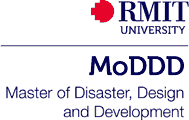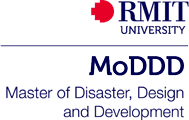Program overview
The Master of Disaster, Design and Development (MoDDD) provides a global learning platform that enables graduates to work locally and internationally in the disaster resilience and management fields. MoDDD is the only degree in the Asia Pacific region that enables students to work full time, while completing most of their degree online, before transitioning their careers into the humanitarian and disaster management sectors.
Developed in close collaboration with global key humanitarian agencies, including the International Federation of Red Cross and Red Crescent Societies (IFRC), UN-Habitat, World Vision International, UNHCR, and RedR, the degree is intended for those with knowledge and skills in built environment, design, project management, engineering, social sciences, communication or health.

